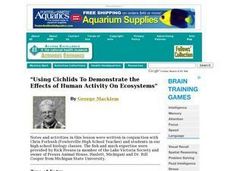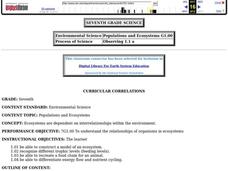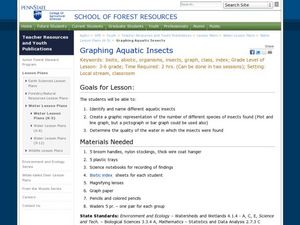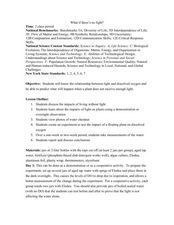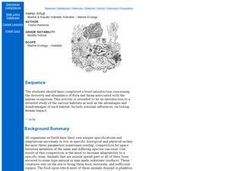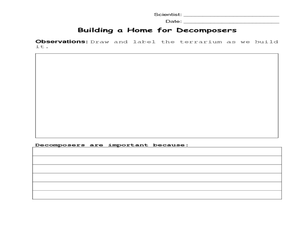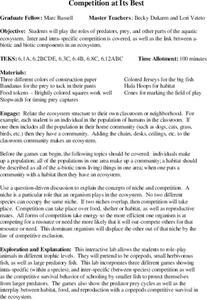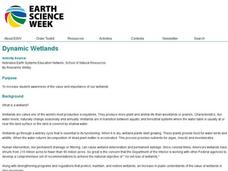Curated OER
Biomanipulation
Students explore the effects of aquatic trophic relationships on water transparency. They observe and explain the effects of reducing nutrient inputs on agal density on water transparency.
Curated OER
"Using Cichlids To Demonstrate the Effects of Human Activity On Ecosystems"
Students explore the freshwater ecosystem of Africa's Lake Victoria by creating a freshwater aquarium. They investigate factors affecting the aquarium's ecosystem and conduct lab activities.
Curated OER
Populations and Ecosystems
Seventh graders create a model of an ecosystem and label it to show structure and function. They research the food web of an aquatic animal and also trace energy flow from the primary producer up the food chain.
Curated OER
Point- vs. Non-point Pollution
Students differentiate between point and non-point pollution and determine how the different types of pollution are harmful to aquatic ecosystems. They complete a series of tests on a sample of "polluted" water and a sample of "pure" water.
Curated OER
Graphing Aquatic Insects
Students identify aquatic insects. In this organism lesson, students locate aquatic insects near a local waterway and collect them. Students graph the amount of insects that they collected.
Curated OER
Photosynthesis and Respiration
Pupils comprehend the relationship between plants and animals in an aquatic ecosystem. They predict the effects of low dissolved oxygen on the organisms. Students create microcosms with plants, animals, or both. They determine which...
Curated OER
Forest In A Jar
Tenth graders are introduced to the process of succession and gain awareness of the changing nature of ecosystems. They demonstrate a comprehension of the dynamic nature of ecosystems, including the relationship between ecological...
Curated OER
Does Clear Water mean Healthy Water?
Learners test their local aquatic site to determine its water clarity. They collect a water sample and measure its turbidity using a sensor, then they repeat the experiment to obtain a second turbidity reading to find the average value.
Curated OER
What If There's No Light?
students discuss the importance of light and the consequences of living without it. Using a plant as a demonstration, students predict and observe what happens to a plant when it does not receive enough light. In groups, they experiment...
Curated OER
The Wonderful World of Slugs
Examine a slug? Of course, what else would a 2nd grader do with it? Pupils use clues and go on a slug hunt, read a slug story, or make a cooperative group mural of a slug's habitat. While older learners catalog slugs, go on a slug hunt,...
Curated OER
Ecosystem Damage from Household Cleaners
Third graders assess the damage done to various ecosystems by cleaning products and discover how scientists test water quality. Using stream water and common household cleaning agents, they work in groups to test for pH levels. Once...
Curated OER
Marine & Aquatic Habitats Activities - Marine Ecology
Students enact the life cycle of a sessile animal and quantify the possibility of survival under the conditions given. They then present to the class a new adaptation which will increase the animals chance of survival.
Curated OER
Ecology and the Conservation of Natural Resources
Learners examine the components of ecosystems. They compare and contrast an ecosystem to an aquatic ecosystem. They examine a local ecosystem and discuss its components.
Curated OER
What Is In The Water?
Students investigate the biotic and abiotic factors that are found in an aquatic ecosystem. The emphasis is upon the investigation of present an projections of future water quality. Then students visit a local body of water to gather...
Curated OER
Fish In The Web of Life
Students will develop skills of fish identification, correlate habitat characteristics with species present, develop a working vocabulary of Oneida fish terminology and fish names and discuss the relationship between a healthy ecosystem...
Curated OER
De-composers - Terrarium
Students explore the environment by building a mock ecosystem. In this rainforest analysis lesson plan, students define many environmental and rainforest related vocabulary terms and discuss the current status of our planet's...
Curated OER
SAV Plants of the St. Mary¿¿¿s River Ecosystem
Students examine the importance of submerged aquatic vegetation in the St. Mary River ecosystem. They identify different characteristics of common eelgrass and discuss water quality, photosynthesis, habitat, oxygen production.
Curated OER
Compettion at its Best
Sixth graders role play predators, prey and other parts of the aquatic ecosystem. They show inter and intra-specific competition as well as the link between abiotic and biotic components in an ecosystem. Students play games about the...
Curated OER
Loss of Wetlands: Subsidence
Learners observe subsidence and the effect it has on wetlands with a classroom demonstration. They think about the impact of global warming and the sea level and how it affects the marsh.
Curated OER
Bahamian Terrariums
Sixth graders create a Bahamian terrarium. In this Bahamian ecosystem lesson, 6th graders watch a PowerPoint to see Bahamian biotic and abiotic factors. They bring in 2-3 items for their terrarium.
Curated OER
Dynamic Wetlands
Students construct and observe a model of two different types of wetlands. In this wetlands lesson, students create a model of a wetland with constant drainage and a wetland that maintains a well-saturated soil. Students observe and...
Curated OER
Introduction to Dissolved Oxygen and Demonstration of a Simple Test Procedure
Students explain the importance of dissolved oxygen in water ecosystems. They describe the aquatic oxygen cycle and the effect of water pollution on oxygen. They make observations, collect data and draw a conclusion.
Curated OER
Understanding Estuaries
Young scholars work together to develop their own estuarine ecosystem in an aquarium. They observe the aquarium daily and record them in a notebook. They discuss the different interactions they see with the class.
Curated OER
Invasives and Macroinvertebrates
Students view macroinvertebrates, or discuss previous collection activity. They graph data on macroinvertebrates in the Hudson River. Students discuss the relationship between habitat, environmental changes, and invertebrate diversity or...



